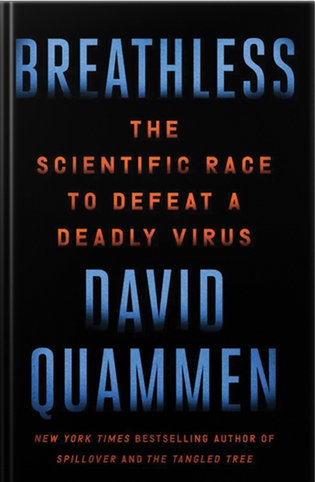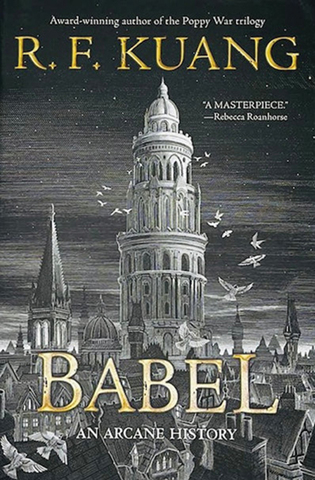
Breathless: The Scientific Race to Defeat a Deadly Virus
David Quammen ’70
Simon and Schuster, $29.99
Reviewed by Randi Hutter Epstein ’90MD
David Quammen ’70 has published his eleventh book, which includes an international cast of characters on a quest to nab a serial murderer. Breathless reads like a fictional thriller. Except that the story is real life. And the killer is invisible. Breathless is about the science of SARS-CoV-2, aka COVID-19.
Quammen is a respected science writer, author, essayist, and novelist, well versed on microbiology and emerging infections. This story plunges right into the drama. On December 30, 2019, Marjorie Pollack, deputy editor of a leading infectious disease newsletter, got word of a strange pneumonia in Wuhan, China. From there, the book goes somewhat chronologically, as COVID spreads, mutates, and spurs competing origin theories. We hear from a vast network of investigators, including computational biologists, evolutionary virologists, epidemiologists, and in-the-field germ-hunters who hail from all over the world. His mission is to spotlight how each scientist provides a unique perspective that “gives us pieces of the whole,” he writes. “Those pieces are often in exquisitely fine focus, but still just pieces.”
At times, Quammen veers away from the action to describe virus biology that’s both accessible and entertaining. Toward the end of the book, he delves into origin theories, explaining the pros and cons of each and why some are more plausible than others. He makes a case for animal-to-human transmission, explaining the science and providing historical context on prior outbreaks. He explains why some researchers believe a laboratory accident may have triggered the pandemic. A natural spillover, he concludes, is highly likely; and while a lab leak is not impossible, the theory is not supported by evidence.
Read Breathless and you’ll be among the smartest raconteurs in the next cocktail conversation about COVID, as long as Quammen isn’t at the party. Plus, you’ll appreciate the awesomeness of this audacious microscopic world around and within us. “The fact is,” he writes, “we live in a world of viruses—viruses that are unfathomably diverse, immeasurably abundant, and ambivalent in their effects, even upon human health and welfare.”
Randi Hutter Epstein ’90MD, Writer in Residence at the Yale School of Medicine, is the author of Aroused: The History of Hormones.
___________________________________________________________________

Gatecrashers
Mark Oppenheimer ’96, ’03PHD
https://www.tabletmag.com/podcasts/gatecrashers
Reviewed by Mark Alden Branch ’86
It’s no secret that most Ivy League schools discriminated against Jews through direct and indirect means for much of the twentieth century. In the eight-part Tablet Studios podcast series Gatecrashers: The Hidden History of Jews in the Ivy League, writer and host Mark Oppenheimer tells the story of how the gates went up, and how they came down.
Oppenheimer, a veteran podcaster who cohosts the Jewish-themed Unorthodox, devotes one episode to each of the eight Ivy League schools, but not as a comprehensive history of Jews in each place. Instead, he deftly uses each school to tell a specific story, and in some cases to make a general point, using extensive interviews with alumni of the schools and with researchers.
The first episode sets the stage, with an account of how Columbia changed its admissions process in the 1920s to disadvantage Jews, adding personal interviews and other subjective criteria that were soon adopted by its peers and that are still part of the admissions process. The episode about Yale looks at how President Kingman Brewster Jr. ’41 reformed the process in the 1960s, bringing an end to the suspiciously predictable ten-percent proportion of Jews in each Yale College class.
But not all of Gatecrashers is about discrimination. Oppenheimer also tells the stories of a 1970s Jewish commune at Cornell and a power struggle at a Jewish sorority at Penn. The Dartmouth episode exists mainly to drive home the point that, despite hardships, most midcentury Ivy League Jews loved their college years.
Oppenheimer’s last episode, set at Harvard, notes a decline in Ivy League students identifying as Jewish after a peak in the 1980s and 1990s. (Yale, he says, went from around 25 percent Jewish to around 10 percent today.) He considers a number of explanations, most of which have little to do with discrimination: a broader applicant pool, for one, but also a reduced drive to succeed among Jews who have become more comfortably part of mainstream American society. “The longer a minority group is in this country,” he concludes, “the more they resemble other Americans in all their wonderful, beautiful mediocrity.”
Mark Alden Branch ’86 is executive editor of the Yale Alumni Magazine.
___________________________________________________________________

Babel, Or the Necessity of Violence: An Arcane History of the Oxford Translators’ Revolution
R. F. Kuang ’27PhD
Harper Voyager, $27.99
Reviewed by brin solomon ’14
Something is always lost in translation. The Hebrew word mitvah (not to be confused with mitzvah, which is etymologically unrelated) nicely captures the sense of the English word draft, as in “an early version not yet polished into final form.” But it misses two other meanings: “a persistent flow of air in a house” and “a volume of liquid poured from a larger container to drink.” And, conversely, the English misses the Hebrew’s strongly visual sense of “a quick drawing.”
In Babel, Rebecca F. Kuang, currently pursuing a PhD in East Asian languages and literatures at Yale, imagines a world where we can get those lost senses back. Set in an alternate-universe version of Oxford in the beginning of the Victorian era, Kuang’s lively novel presents a kind of magic whereby a bar of silver engraved with a word and its translation can manifest into reality whatever that translation leaves out. (Thus, draft and mitvah engraved on such a bar might freshen a stuffy room with little gusts of outside air.)
It’s easy to imagine a story set in such a world—one that focuses primarily on the personal struggle between one silver worker and another. But Kuang has her sights on a more sweeping narrative. Through the focal point of a young Cantonese boy, raised by a cruel guardian to help expand Britain’s imperial power, Babel takes furious aim at empire’s physical and psychological violence, its relentless drive to expand by consuming everything in its path. The story is set in a magical alternate past, but the dilemmas it poses are burningly urgent to the present world.
brin solomon ’14 is a music journalist, composer, playwright, and Jewish liturgist.
 loading
loading

